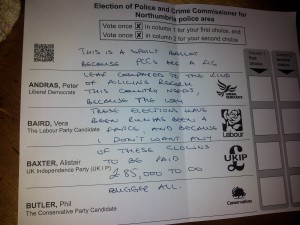(In which the blogger is hurt and raw and makes some possibly ill-advised political predictions.)
I’ve been at a conference for the last two days so I’m still processing the election result. Hindsight is a wonderful thing, but in some ways we could have seen this coming. And while I’m in many ways delighted for the SNP and somewhat gleeful at the complete collapse of the Lib Dems, both will bring deep structural problems with them. I am considering dropping some long-term activism work to focus on alleviating some of the immediate and very real harm our new lizard overlords will cause, but at the same time I’m very aware that we can’t afford to drop long-term work because that will only come back to bite us. This government will cause misery, suffering and death in the short term, but in many ways that is only a smoke screen for longer-term projects which will just perpetuate and multiply that suffering. Here’s the five things I’m most worried about on that longer term front:
- The EU referendum. I genuinely don’t think that David Cameron has lost connection with reality to the extent that he believes Britain would be better off out of the EU. Leaving the EU would very much be an act of cutting off your nose to spite your face. But I do believe that for a series of short-term gains with both his backbenchers and certain sections of the electorate he has talked himself into a corner and set events into motion that he will not be able to control. A UK exit from the EU would be pointless at best and geopolitically disastrous at worst.
- The Human Rights Act. The dominant discourse on human rights in this country continues to baffle me. There’s a certain theme of cutting off your nose to spite your face going on here. It’s almost as if the British public doesn’t realise that they, too, are human. Scrapping the Human Rights Act will of course exacerbate a lot of the short-term immediate hurt this government will cause as many will lose a last recourse to justice, and will entrench inequalities and injustices in the long run.
- The Gerrymandering Bill. As if First Past The Post isn’t sufficiently fucked up, this will exacerbate some of the worst issues of the current electoral system and make future Tory majorities more likely. This is the last nail in the coffin of electoral reform for at least a generation.
- The Snoopers’ Charter and other surveillance. Granted, a Labour majority government would have probably pushed this one through as well, but this is now a near-certainty. Strengthening the surveillance apparatus of the state is bad news for anyone who is in any way marginalised and attempting to resist. It’s only a matter of time until it’s also bad news for those who believe that they have nothing to hide and thus nothing to fear. Some may also remember that the “emergency” Data Retention and Investigatory Powers Act 2014 has a sunset clause and can only be renewed by passing new primary legislation. DRIP expires in the middle of this Parliament, I am not holding my breath for it to not be renewed.
- Scotland. I have mixed feelings about this one. If the Scots do manage a second run at independence and do get away, I shall wish them much joy. (I actually think even if the Tories are now prepared to genuinely put Devo Max on the table, that will exacerbate the issues and hasten the demise of the Union.) None of which changes the fact that Scottish independence would leave the rest of the UK even more thoroughly screwed.
So yes. Survival will become even more difficult over the next five years, and it is vital that we try and alleviate the pain. But we need to at least keep an eye on the long term, lest those five years turn to fifty.
